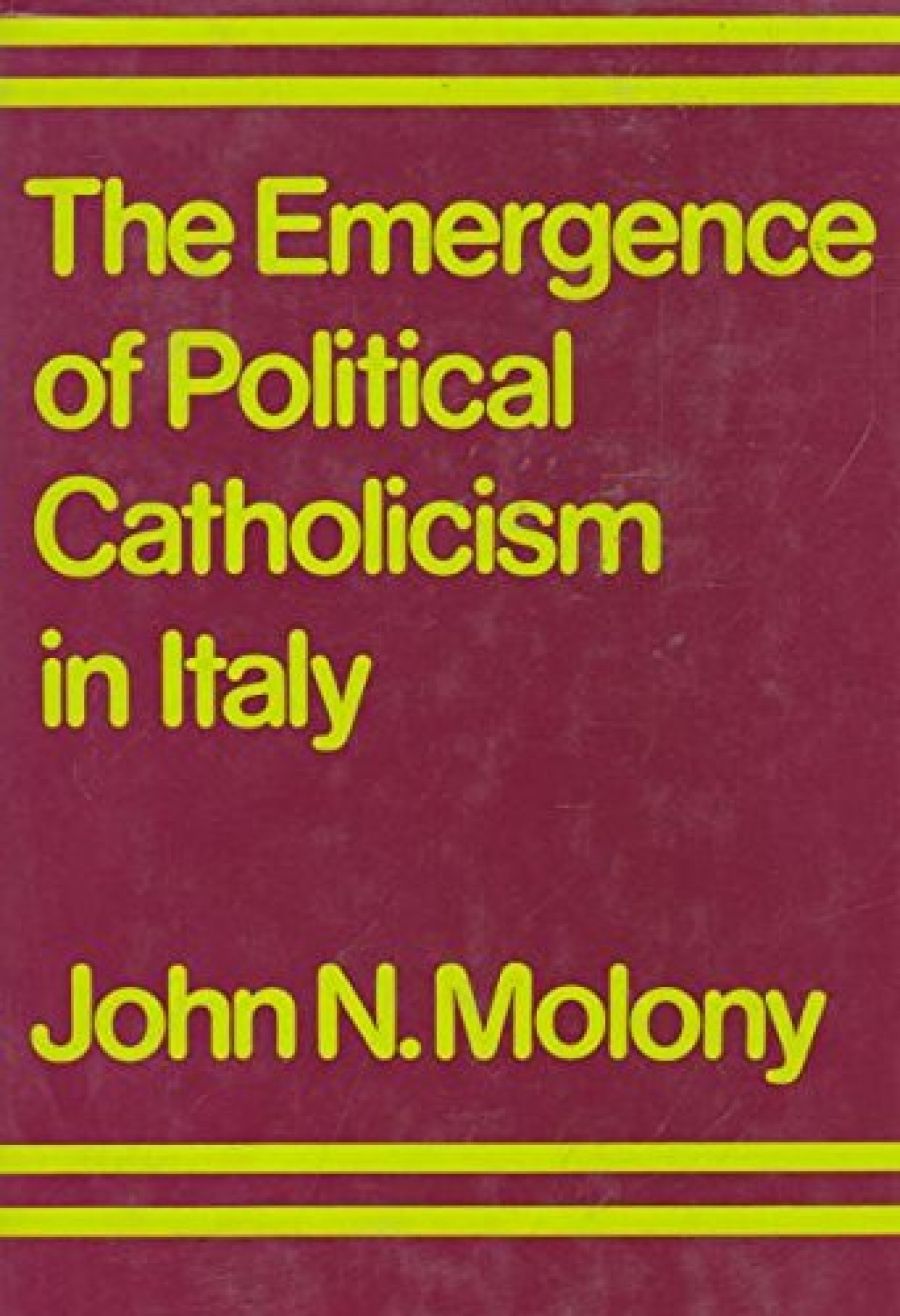
- Free Article: No
- Contents Category: History
- Review Article: Yes
- Article Title: Politics of principle
- Online Only: No
- Custom Highlight Text:
After Italian troops had invaded the Papal States to establish the nation’s capital in Rome in 1870, Italian Catholics were prohibited from voting in political elections. When this policy began to be relaxed in late 1918, a Sicilian priest, Luigi Sturzo (1871–1959), founded the Partitio Popolare Italiano (PPI) which was to be aconfessional but ‘inspired by Catholic principles’. It was the precursor of the Christian Democratic party that has ruled Italy for the past thirty years.
- Book 1 Title: The Emergence of Political Catholicism in Italy
- Book 1 Biblio: Croom Helm London, 225 pp, $21.60
John N. Molony, professor of history at the ANU, traces the short, unhappy life of the PPI until, deserted by Pope Pius XI, it was destroyed by Mussolini only six years after its foundation.
Sturzo had ardent faith in parliament; he early saw the importance of regionalism and some of his analyses are relevant even today ‘in Italy, the government, any government, is already prisoner of a bureaucracy which is tied … to a new class of profiteers of the state.’
Sturzo’s defects seem to have been insufficient appreciation of the importance of the industrial trade unions concentrated in north Italy; a failure to calculate the Holy See’s diffidence towards an authentically aconfessional party; and the fact that, although not at all ‘clerically-minded’, Sturzo as a cleric could not lead his party in parliament.
Sturzo’s aim was rejuvenation of all aspects of Italian society rather than merely promoting Catholic interests. In particular, he did not give high priority to resolving Holy See-Italy relations. To do so would probably have left him open to a charge of being clerically minded. But not to have done so left his flank wide open to Mussolini.
To have any chance in opposing fascism, Sturzo’s party needed to ally itself with the Socialists. Sturzo was prepared to form a common front but could not carry all his supporters with him because of the Socialists’ history of violent anti-Catholicism.
Mussolini was shrewd enough to offer the Holy See an advantageous solution of the ‘Roman’ question, sealed in the 1929 Concordat which established the Vatican City-state and provided financial compensation for what had been lost in 1870. Pius XI turned his back on Sturzo, who was contemplating an alliance with the atheistic Socialists, to do a deal with. Mussolini ‘the man of (Divine) Providence’.
It is a sad story which seems inevitable as Mussolini was more agile and ruthless than Sturzo, the divided left or the sclerotic representatives of the older regime. Moreover, international opinion was acclaiming him as the man who, gaining power constitutionally, had saved Italy from leftwing chaos. Mussolini was uninhabited by principles or precedents.
Molony could have taken a harder look at his prose style (‘No one could dream of the chords his [Mussolini’s] example would strike in the diseased mind of a Teutonic enormity. No one could look down the dark tunnel that would lead to a maelstrom of horror for Europe and the world – a tunnel into which Western Europe stepped ...’) but his is a meticulous account of the divisions within Italian society which enabled Mussolini to make his takeover. Probably no substantial additions will be made to the story until the Vatican archives for the period are opened. As they have Just been the opened archives up to for 1903, it may be 2015 before the archives for Pius XI’s reign (which ended in 1939) are opened.


Comments powered by CComment